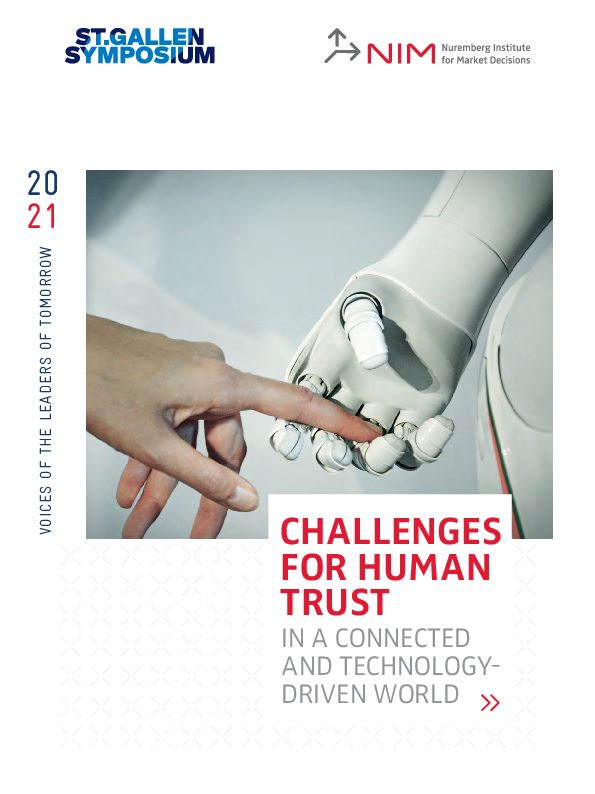Study
Gaspar, C., Dieckmann, A., Neus, A., & Kittinger-Rosanelli, C. (2021). Challenges for human trust in a connected and technology-driven world. Voices of the Leaders of Tomorrow 2021. Nürnberg Institut für Marktentscheidungen & St. Gallen Symposium.
2021
St. Gallen Symposium
Challenges for Human Trust in a Connected and Technology-Driven World
Challenges for Human Trust in a Connected and Technology-Driven World
Since 2014, we have been publishing the global study "Voices of the Leaders of Tomorrow" (formerly Global Perspectives Barometer – Voices of the Leaders of Tomorrow) in cooperation with the St. Gallen Symposium. This year's study gives top talents and young professionals from over 80 countries a voice and provides insight into the opinions and thoughts of the next generation of leaders.
In 2021, the annual flagship study explores how the next generation of leaders view the role of – and ways to strengthen – trust in politics, media, business and technology. The report explores what trust means to young top talents (n=620), particularly in light of an increasingly connected and technology-driven world – giving voice to the St. Gallen Symposium’s Leaders of Tomorrow (LoT) community.

Key insights:
- There is a severe lack of trust in the older generation of leaders regarding their decisions in the interests of younger generations. Only 15% of the Leaders of tomorrow think that the political leaders of today are both competent and willing to prioritize and to decide in the best interest of the younger generation, while 26% of them trust business leaders in both respects.
- COVID-19 is a massive trust disruptor; trust in governments, social media, press – and even in fellow citizens – has been lost. 48% of the Leaders of Tomorrow report that trust in their fellow citizens decreased during the pandemic; just 25% state that it increased.
- Corrosion of shared reality: Facts are increasingly drowned by opinions and outright lies, and social media is seen as the main culprit. 76% of the Leaders of Tomorrow consider it a pressing problem that the line between objective facts and subjective opinion is getting more and more blurred in the media. 90% report that fake news frequently circulate in social media.
- Companies are expected to do more to flag and prevent fake reviews and ratings online. 78% of the Leaders of Tomorrow agree with the statement “Most online companies and platform providers do not do enough to flag and prevent fake reviews.”
- To enhance trust in technologies, more transparency on how personal data is used and better education on the benefits and risks of emerging technologies are essential. 82% of the Leaders of Tomorrow consider easy access to information about how one's data is used as an urgent or at least necessary means to increase trust in tech.
- To reduce negative effects of new technologies on society, the Leaders of Tomorrow call on their own generation to do more. 75% of the Leaders of Tomorrow criticise their own generation for not doing enough to combat the effects of fake facts amplified by new technologies.
- Trust in AI varies dramatically depending on the task: Confidence is high in automated driving and rule enforcement but low in domains requiring expert intuition or empathy. 61% of the Leader of Tomorrow would rather rely on a self-driving car than on a human driver, while just 7% would rather rely on AI than on a human psychotherapist.
Authors
- NIM
- St. Gallen Symposium
Contact
Gaspar, C., Dieckmann, A., Neus, A., & Kittinger-Rosanelli, C. (2021). Challenges for human trust in a connected and technology-driven world. Voices of the Leaders of Tomorrow 2021. Nürnberg Institut für Marktentscheidungen & St. Gallen Symposium.

